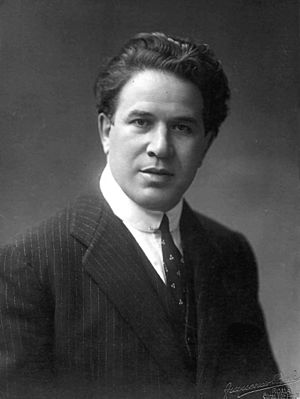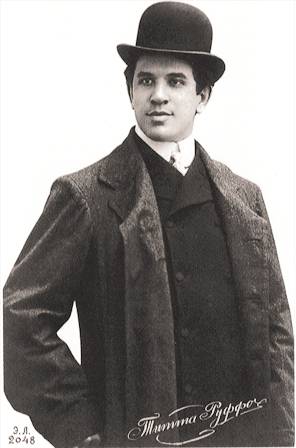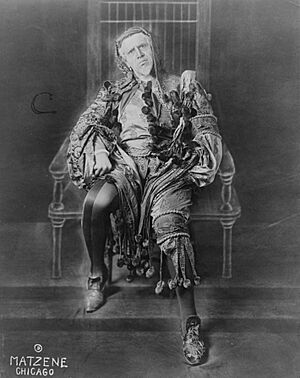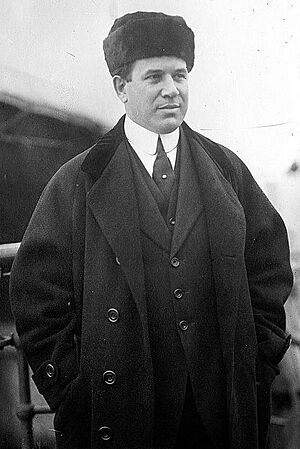Titta Ruffo facts for kids
Quick facts for kids
Titta Ruffo
|
|
|---|---|

Portrait of Titta Ruffo, c. 1920s
|
|
| Born |
Ruffo Cafiero Titta
9 September 1877 Pisa, Italy
|
| Died | 5 July 1953 (aged 75) Firenze, Italy
|
| Nationality | Italian |
| Occupation | Operatic baritone |
| Years active | 1898–1931 |
Titta Ruffo (born September 9, 1877 – died July 5, 1953) was a famous Italian opera singer. He was known as a baritone, which is a male singing voice that is lower than a tenor but higher than a bass. People called him "Voce del leone," meaning "voice of the lion," because his voice was so powerful.
Even other famous singers admired him. Giuseppe De Luca, another baritone, said Ruffo's voice was "a miracle." Walter Legge, a well-known music producer, even called Ruffo a "genius."
About Titta Ruffo
Titta Ruffo was born Ruffo Titta in Pisa, Italy. He later changed his name for the stage to Titta Ruffo. His father was an engineer.
Titta Ruffo studied singing with several teachers. He once wrote that his brother, Ettore, was the most important teacher for him. He said he studied with his brother for six years. Other teachers had told him he didn't have a good voice or musical talent.
Ruffo started his opera career in 1898. His first performance was in Rome as the Herald in Wagner's Lohengrin. At first, his career was slow. But in the early 1900s, he became very famous around the world. People loved his strong voice and powerful acting.
He performed in many big cities. These included Buenos Aires (1902), London (1903), and Milan (1904). He also sang in Paris (1911) and São Paulo (1911). Titta Ruffo first sang in the United States in Philadelphia in 1912. He also performed a lot in Chicago.
He joined the Italian army during World War I. After the war, he finally sang at the famous Metropolitan Opera in New York in 1922. His first role there was Figaro in The Barber of Seville. He performed 46 times at the Met until 1929. In 1929, he signed a big movie contract.
Titta Ruffo stopped singing in 1931. He lived in Switzerland and Paris for several years. He wrote a book about his life called La mia parabola. Later, in 1937, he went back to Italy. He was arrested there because he spoke out against the government at the time. He was against the Fascist regime and believed in socialist ideas. His sister was married to Giacomo Matteotti, a politician who was murdered. After that, Ruffo promised he would never sing in Italy again.
Titta Ruffo passed away in Florence, Italy, on July 5, 1953. He was 76 years old.
His Voice and Recordings
Titta Ruffo sang many important baritone roles in French and Italian operas. Some of his famous roles included Rigoletto, Di Luna, Amonasro, and Scarpia. He also sang Figaro in Rossini's The Barber of Seville. He was also known for roles in operas that are not often performed today.
Like another famous singer, Enrico Caruso, Ruffo had a new style of singing. He focused on power and a rich, strong voice. Some people compared him to an older singer, Mattia Battistini. Battistini was known for a smoother, more elegant style. But modern experts say both singers were very skilled and had great control over their voices. They even shared a teacher!
Walter Legge, a music critic, praised Ruffo's singing in 1928. He said Ruffo's voice was "overwhelmingly beautiful." He also noted Ruffo's amazing control, strong breathing, and perfect phrasing. Legge called him a "genius."
Titta Ruffo made many recordings. He recorded over 130 songs on old 78-rpm records. He started recording in Paris in 1904. Later, he recorded for a company that became His Master's Voice/EMI Records. When he came to the United States in 1912, he started recording for the Victor Talking Machine Company. He continued recording until 1929.
His voice sounded very good on these early recordings. It was so rich and clear that you can still hear how great he was, even on old records. He kept recording after 1925, when new electric recording methods came out. However, some experts say his voice was not quite as strong in these later recordings.
Experts often point to two of Ruffo's recordings as examples of his best work. One is the Brindisi from Hamlet, which shows his amazing breath control. The other is "All'erta, marinar!" from Meyerbeer's L'Africaine. This recording shows the power and brightness of his high notes. For examples of his quick and agile singing, his early recordings of "Largo al factotum" from Il barbiere di Siviglia are excellent.
Ruffo was unusual for his time because he didn't sign a long-term contract with just one opera company. He was a "freelancer" and a traveling star. He always got top billing and the highest fees wherever he sang. He was the only male opera singer who could earn as much as Caruso.
It's surprising that Ruffo and Caruso didn't sing together very often. They only made one recording together in 1914. Some people think they were a bit jealous of each other. Another reason is that most opera houses couldn't afford to pay both of their huge fees at the same time!
After he retired, Ruffo refused to teach singing. He said, "I never knew how to sing; that is why my voice went by the time I was fifty." He felt he shouldn't teach something he didn't fully understand himself. However, his voice was in great shape for about 26 to 27 years, which is a very long and successful career for a singer.
See also
 In Spanish: Titta Ruffo para niños
In Spanish: Titta Ruffo para niños




